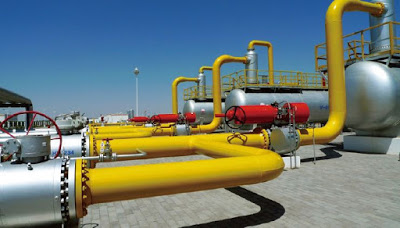Liquefied Natural Gas (NLNG) Ltd., says its ongoing plans to reach a Final
Investment Decision (FID) on its Train-7 project by December will make Nigeria
the World’s 3rd largest gas
exporter.
Manager Production, Mr Tayo Ogini, said this on Saturday while making a
presentation on the facility located at Bonny Island on Saturday.
was to acquaint the Minister of State for Petroleum Resources, Dr Ibe Kachikwu
who visited the plant to see the progress made on the project so far. According
to the presentation, Nigeria is presently the fourth exporter of gas in the
world. The NLNG has six operational trains (gas plants).
The first train was built in 1989 but by 2007 till date, plans to build Trains
7 and 8 were shelved. The six trains have a combined capacity to produce 22
metric tonnes per annum (mtpa) of Liquefied Natural Gas (LNG). However, plans
to invest seven billion dollars on the Train-7 project would expand its
production capacity to 30 mtpa making Nigeria the 3rd largest exporter of gas
in the World after Qatar and Australia.
Ogini said the gas produced in Nigeria was world-class, adding that the NLNG
had built a reputation of reliability in its gas supplies around the world.
the hub of crude oil exporters on the island namely: Shell SPDC, ExxonMobil and
the NLNG can easily produce two million barrels of oil per day.
country had 23 NLNG carriers which had sailed more than 4,000 cargoes making it
the largest in Africa.
the companies were being faced by inadequate infrastructure, adding that with
the three-year Bonny-Boro road project which the company had embarked on, part
of the problem would soon be addressed.
Kachikwu commended the NLNG management for its efficiency, saying the company
was a testament to the fact that things could be properly done in Nigeria. He
recalled that during the cash crunch of 2016, NLNG saved the day and helped to
avert a shutdown of the nation’s economy.
minister of state, the Train-7 project is fantastic but Nigeria is not yet
where it should be. He challenged the NLNG to begin to think of exporting 40
mtpa over the next 30 years, as well as tackle the issue of gas pricing as most
importers of domestic gas prefer to bring in shipments than to patronise the
NLNG.
Kachikwu, who also inspected the faciloity, said Nigeria’s 2019 elections would
not interfere with the company’s expansion plan. He said that whatever happened
at the polls, FID on Train-7 as well as its construction would go ahead.
Brass and Olokola LNG projects, he scored the companies 100 per cent in terms
of performance. “We have opportunities that are stranded everywhere – Brass LNG
in terms of shareholding and financing; OKLNG in terms of even taking off the
ground.
“I am saying as the grandfather of this business – they built six trains,
looking at seven, hopefully potentially more. Let’s begin to look at minimal
investments, through structures and designs and reconfiguration and expert
advice.
hand-hold some of those trains that are beginning to lag behind so that the
whole founding father concept of ‘take this all over the place’ can happen.
be reaching out to them, not from an imposition point of view but from a
collaborative point of view to see what we can do and learn from what they have
done well.”
Also speaking, the Executive Secretary, Nigerian Content Management
Development Board (NCDMB), Mr Simbi Wabote said his agency had moved to ensure
the Train-7 project would be built with consideration to Nigeria’s local
content law in the industry.
them conscientiously to ensure that the FEED contract was signed within record
time and we have a clear service level agreement between ourselves and NLNG to
ensure that we fast-track the contracting cycle.
very important to ensure that we take FID at the end of the year as soon as we
finish FEED work.
focus more with them to ensure that the letters of the law are properly
interpreted in terms of construction phase of the plant as well as its
management phase,’’ Wabote said.
NLNG’s shareholding structure, the Nigerian government through the Nigerian
National Petroleum Corporation (NNPC) owns 49 per cent of its shares.
Other shareholders are Shell Gas B.V. 25.6 per cent, Total Gaz Electricity
Holdings France 15 per cent, and Eni International – 10.4 per cent. The company
also recently signed agreements with consortia to embark on FEED for the
Train-7 ahead of the FID in December. (NAN)

